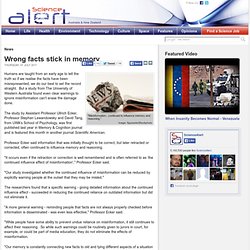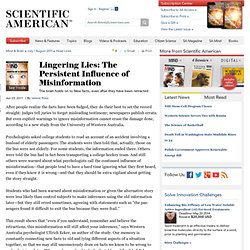

Nazi brainwashing started with Germany's youths. Mud Does Stick: Interview With Prof. Ullrich Ecker University Of Western Australia. Wrong facts stick in memory. "Misinformation...continued to influence memory and reasoning.

" Image: flyparade/iStockphoto Humans are taught from an early age to tell the truth so if we realise the facts have been misrepresented, we do our best to set the record straight. But a study from The University of Western Australia found even clear warnings to ignore misinformation can't erase the damage done. The study by Assistant Professor Ullrich Ecker, Professor Stephan Lewandowsky and David Tang, from UWA's School of Psychology, was first published last year in Memory & Cognition journal and is featured this month in another journal Scientific American.
Professor Ecker said information that was initially thought to be correct, but later retracted or corrected, often continued to influence memory and reasoning. Lingering Lies: The Persistent Influence of Misinformation. After people realize the facts have been fudged, they do their best to set the record straight: judges tell juries to forget misleading testimony; newspapers publish errata.

But even explicit warnings to ignore misinformation cannot erase the damage done, according to a new study from the University of Western Australia. Psychologists asked college students to read an account of an accident involving a busload of elderly passengers. The students were then told that, actually, those on the bus were not elderly.